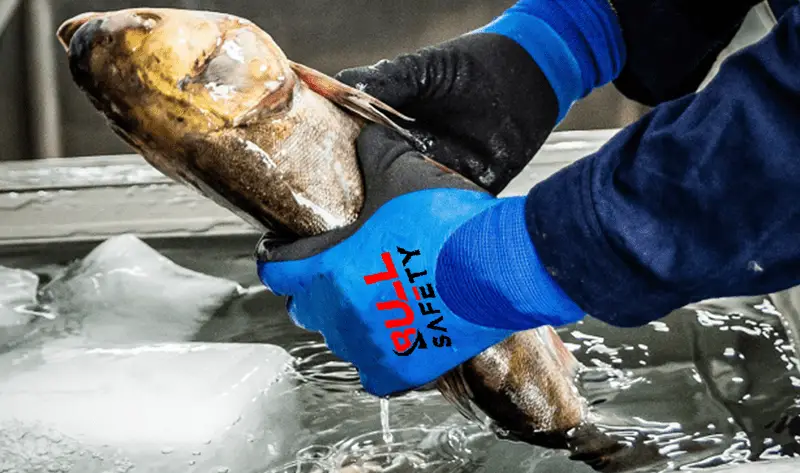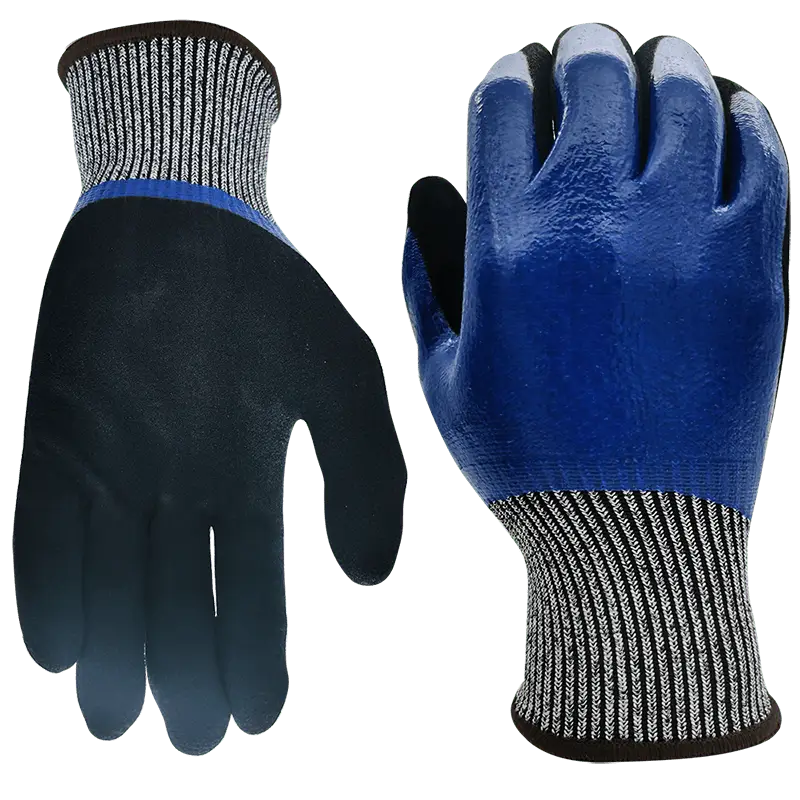
Why Waterproof Gloves Are Essential for Workplace Safety
I’ve been in the protective gloves industry for years, and I know how crucial waterproof gloves are in wet, hazardous, or chemically demanding environments. Keeping hands dry and protected is not just about comfort—it’s about preventing injuries and improving productivity1.
Waterproof gloves protect against cuts, burns, and chemical exposure.2 They also enhance grip and safety3, making them indispensable in industries like construction, manufacturing, and agriculture.
Key Features of the Best Waterproof Gloves for Industrial Use
Choosing the right waterproof gloves for industrial applications means paying attention to durability, grip, breathability, and fit. Here’s what I always look for:
| Feature | Why It Matters |
|---|---|
| Material Quality | Strong materials like rubber or nitrile resist water and chemicals effectively. |
| Grip and Dexterity | Textured surfaces improve handling, even in wet conditions. |
| Breathability | Breathable gloves prevent excessive sweating, reducing discomfort during long shifts. |
| Durability | Durable gloves last longer, withstanding wear and tear. |
| Size and Fit | A good fit ensures comfort and prevents gloves from slipping off. |

How to Choose the Right Waterproof Gloves for Different Industries
Not all waterproof gloves are the same, and picking the right pair depends on your industry needs. Here’s what I recommend for different sectors:
1. Construction and Heavy-Duty Work
Construction workers need durable, puncture-resistant rubber gloves4 with cotton or fleece linings for comfort in wet conditions.
2. Agriculture and Food Processing
For handling food and chemicals, nitrile gloves5 work best since they are waterproof, chemical-resistant, and easy to clean.
3. Chemical Handling
If you work with harsh chemicals, neoprene gloves6 provide superior chemical resistance and water protection.
Top Waterproof Gloves: Comparing Leading Brands and Models
I always compare top brands before choosing gloves. Here’s a breakdown of some of the best waterproof gloves available today:
| Brand/Model | Material | Key Features | Best For |
|---|---|---|---|
| HexArmor 9000 Series | Rubber | Puncture-resistant, chemical-resistant | Heavy-duty construction work |
| Mechanix Wear M-Pact | Nitrile | Impact protection, waterproof, flexible | General industrial tasks |
| Showa 310 | Nitrile | Waterproof, abrasion-resistant, flexible | Food processing, agriculture |
| Ansell AlphaTec 58-530 | Neoprene | Chemical resistance, waterproof | Chemical handling, lab work |
Material Matters: The Best Waterproof Glove Materials for Durability
Choosing the right glove material makes a big difference in performance7. Here’s a breakdown of common materials and their pros and cons:
| Material | Advantages | Disadvantages |
|---|---|---|
| Rubber | Excellent waterproofing, durable8 | Can be heavy and less breathable |
| Nitrile | Flexible, resistant to oils and chemicals | Can degrade with prolonged exposure to harsh chemicals |
| Neoprene | Good chemical resistance, flexible9 | Not as durable as rubber or nitrile |
| PVC | Affordable, water-resistant | Limited chemical resistance, less durable |
Certifications and Compliance: Ensuring Quality and Safety
Whenever I buy waterproof gloves, I always check for industry certifications10 to ensure safety and compliance:
- CE Marking11: Confirms compliance with EU safety standards.
- ANSI/ISEA 105: Provides ratings for abrasion and puncture resistance.
- EN 388: Specifies mechanical protection against abrasion and tearing.
- Oeko-Tex: Ensures gloves are free from harmful chemicals.
Cost vs. Quality: Finding the Best Waterproof Gloves Within Your Budget
I always balance cost and quality when choosing gloves. Here’s what I consider:
- Focus on Key Features: Pick gloves based on essential needs like grip, flexibility, or chemical resistance.
- Look for Bulk Discounts: Buying in bulk often lowers costs per pair.
- Think About Durability: A cheaper glove might wear out fast, leading to higher long-term costs12.
Maintenance Tips for Waterproof Gloves: Maximizing Longevity
To extend the life of waterproof gloves, I follow these best practices:
| Tip | Description |
|---|---|
| Regular Cleaning | Hand wash with mild detergent and lukewarm water to prevent material breakdown. |
| Avoid Harsh Detergents | Strong chemicals can damage waterproof coatings. |
| Proper Storage | Store gloves in a cool, dry place to avoid UV damage. |
| Replace When Necessary | If gloves show signs of wear, replace them to maintain safety. |
Are Nitrile-Coated Gloves Waterproof?
Nitrile-coated gloves are water-resistant, not fully waterproof. They protect against splashes and moisture but will absorb water over time. If you need full waterproof protection, rubber or PVC gloves are better choices.
| Glove Material | Water Resistance | Ideal Use |
|---|---|---|
| Nitrile | Water-resistant, not waterproof | Handling light moisture, chemicals |
| Rubber | Fully waterproof | Extended contact with liquids |
| PVC | Fully waterproof | Prolonged exposure to liquids |
Conclusion
Waterproof gloves are essential for protecting workers across different industries. Whether you’re in construction, food processing, or chemical handling, choosing the right material and certification ensures both safety and comfort.
By understanding glove materials, key features, and industry certifications, you can confidently select the best waterproof gloves for your team. If you’re unsure which gloves to choose, consider your specific needs and go for a balance of durability, grip, and protection. Your hands deserve the best!
-
Understanding these benefits can help you enhance workplace safety and efficiency, leading to better outcomes for your team. ↩
-
This resource will provide insights into the protective features of waterproof gloves, essential for safety in hazardous environments. ↩
-
Exploring this topic can reveal how proper gloves can significantly reduce workplace accidents and improve overall safety. ↩
-
Explore this link to find top-rated rubber gloves that ensure safety and comfort for construction workers. ↩
-
Discover why nitrile gloves are the go-to choice for food safety and chemical resistance in agriculture. ↩
-
Learn about the advantages of neoprene gloves in protecting against harsh chemicals and ensuring safety. ↩
-
Understanding how glove materials impact performance can enhance your selection process for better durability and functionality. ↩
-
Explore the best materials that offer excellent waterproofing and durability to ensure your gloves last longer and perform better. ↩
-
Discover materials that balance chemical resistance and flexibility, crucial for various applications in demanding environments. ↩
-
Understanding industry certifications helps ensure you choose gloves that meet safety and quality standards. ↩
-
Learning about CE Marking can help you understand its significance in ensuring safety and compliance in gloves. ↩
-
Exploring the impact of long-term costs can guide you in making a more economical and durable choice for gloves. ↩



